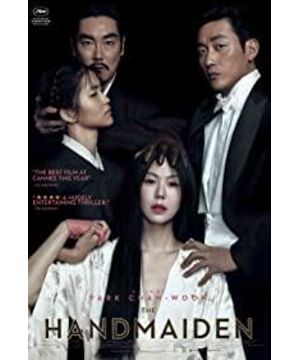{★★★★}
Just after I read the extended version of "Miss" in English for the first time, I was amazed that this is a film with such meticulous planning, ingenious mechanism, and rugged beauty as a bonsai, like climbing a strange peak indoors. The picture scroll, I picked up the details along the way, but I was always afraid of missing something in my busy schedule. So I read it a second time in Chinese characters. I can continue to watch the third and fourth times, but that doesn't change the delicate disguise that we still can't penetrate "Miss". Beauty also disappeared. The beauty of "Miss" is its enigma, its ad hoc arrangement: it is a labyrinth, we walk in and out, it stays still; the mediocre mystery movie is a knot we pick up and untie, It is never the same again.
But that doesn't mean that we can't explore and savor the mystery of "Miss" and the reason why it exudes beauty. Let's start with structure. Like its predecessor, the British drama "Fingerman's Love", "Miss" uses a three-paragraph narrative, and unfolds from a different character's perspective in each chapter. In addition, the story flowers that bloomed on British soil were grafted to Korea during the colonial period, so from a cultural point of view, this is a one-fold triptych: each panel highlights a unique color, and each panel is in turn Talk to the audience with a tone that is completely different from each other.
Open this fold. The first couplet is the calm before the rainstorm, and the restraint of the Japanese style and the fashion of the Western-style house together show a slightly gloomy but comfortable and smooth scenery. Some commented that the first couplet deliberately imitated British dramas, which greatly reduced its charm. I don't think so. The sparse drama in the foreshadowing gives us more time to focus on the two women, indeed, to say that this is a lesbian movie greatly understates its aesthetic value, but it must be about Women's Movies. Kim Min-hee, who is naked in the bathtub, Kim Tae-ri, who only shows half of her face in front of the window; close-up of her facial features when she grinds her teeth, close-up of her lips and teeth when kissing... and so on, to name a few.
The second couplet is a reversal of the plot, a morbid sexual tug-of-war, and the poisonous ink that blackens the clear spring of the first couplet. In the Second Alliance, all the impressions of the First Alliance collapsed and were replaced by bottomless malice. But it has to be said that the splendor of the second couplet is inseparable from the suggestion of the first couplet, just like a conspiracy of hypnosis. This suggestion is not only plot, not only intended to obtain a cheap reversal, but also visual and subtle.
Just like the copper beads and white rope that Sook Hee found by rummaging through boxes in the lady's house, these two objects have a very strong symbolic meaning in this movie. They are not just there, they are placed here by Park Chan-wook. The copper beads symbolized the cruelty of the uncle, and the white ropes symbolized human sacrifices with moral corruption—but we didn’t know at the time that the copper beads in Shu Ji’s eyes were just copper beads, and the white ropes were just white ropes. But once we know, we begin to approach the truth of the mansion.
These echoing objects are the gates of countless institutions in the mansion, and they are also the keys to countless secret doors in the story. The first two couplets of "Miss" both take place in this huge house, but the house is not only a prison of human nature, but also a symbol of the story itself. The movie blindfolds half of our eyes to show us the partial truth, and then removes the blindfold to let us see the whole truth. Why not the house? Isn't what Sook Hee saw, like the copper beads and the white rope, a deceptive truth about the house?
In the second couplet, the most original scene is Hideko's book club. Park Chan-wook vividly demonstrated his understanding of the tension of sexual desire in this lewd book reading, and easily bound obscene and obscene language into the frame of elegance, strictness and alternative aesthetics. Hideko was imprisoned in the mansion, of course. But here, she is even more imprisoned indoors. From the mansion to the interior, people are further crushed into playthings that can be manipulated in the palm of their hands, such as bonsai, which are fixed at a specific position and angle and cannot move. Repressed sex means absolute order, and absolute order is sometimes fertile ground for dehumanizing. Sometimes, during the reading, Juliet becomes Hideko herself, the duke becomes the housekeeper, the knight becomes the earl. Is this just pure role play? It's true that role-playing and sex are inseparable, but the role-playing here is real. The duke whipped the lady, just as the housekeeper abused Hideko; the lady whipped the knight, just as Hideko made the guests lustful. There's an underlying contrast here: The people watching Hideko shame Hideko with their eyes, but Hideko, like a corpse, doesn't look at any of them.
The third couplet is redemption, black humor, and the one with the strongest sense of comics. At first, I thought the off-line of the third couplet was redundant, but now I ask myself, if I was really moved by the love between Xiuzi and Shuji in the first two couplets, why would I dislike the fun of the triplet? Because the meaning of existence of the third couplet is the return from perverted sexual desire to lingering erotic desire. Here, there is a problem that cannot be ignored, that is, "Miss" is often criticized for having too much male gaze. I don't know how to define the male gaze exactly, but even the acclaimed Palme d'Or "The Life of Adele" was criticized for that. Where are the boundaries of the male gaze, I can't say for sure. But in addition to depicting same-sex love, "Adele" and "Miss" have a big thing in common, that is, both Kexixu and Park Chan-wook put sex before love. "Adele" depicts sex far more than the love between the two girls. It can even be said that Adele and Emma are not like-minded, and their passion burns out quickly. Not to mention "Miss", from what I said above, the film basically revolves around sexual desire. The classmates also think that "Fingersmith's Love Picking" is more emotional, while "Miss" is not delicate in depicting emotions.
Am I trying to say that sex is second in status to love? totally not. In fact, in the case of "Miss" in particular, it is sex that completes the final piece of the puzzle. For Hideko, who hates the love between men and women, Sook Hee cares for her, and Sook Hee lets her experience sexual pleasure for the first time. But the order of lust and love makes it easy to take aim at the hat of the male gaze. If there are any traces of male gaze, it must be the bed scene at the end of the film. It's hard for me not to think of erotic pictures, which are full of male gazes. But precisely because this scene was so explicit, I seemed to hear Park Chan-wook's provocative laughter, as if he was making fun of men who speculate about women's sexuality only with delusions in their minds, making fun of their former readers for turning the shackles of their souls into A happy springboard, and get rid of those superficial opposite sex forever. Maybe that included himself, I guess.
View more about The Handmaiden reviews











